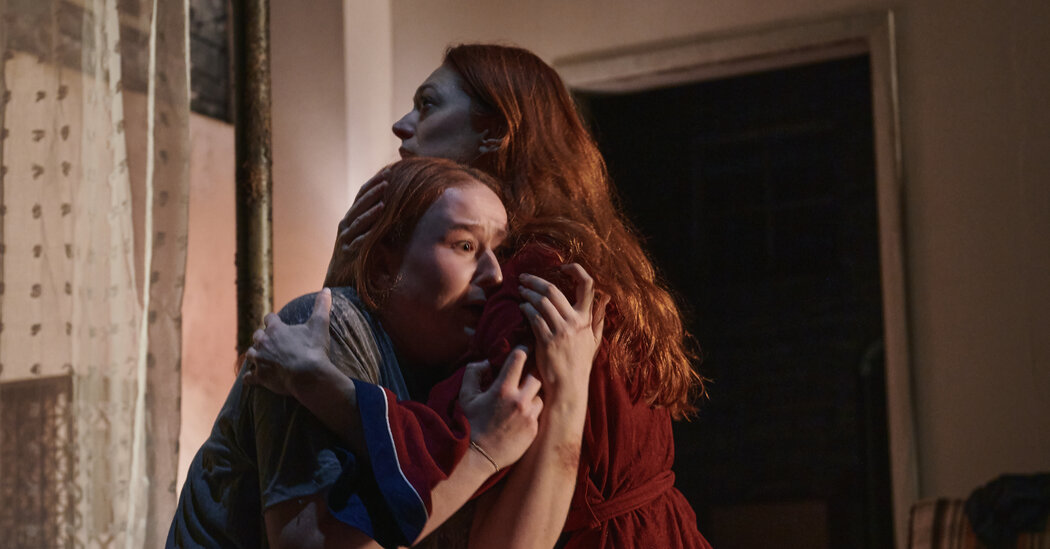One person left behind a box of clocks. Someone else left kids clothing — “tags still on, folded, never used.” Many bras have also remained in this subdivided basement apartment in Queens, as well as shoes, a guitar and a family of dolls with no facial features. The invoking of these objects makes the setting of Martyna Majok’s powerful Off Broadway play “Queens” feel like a reliquary, a sacred sanctuary of the dispossessed.
Numerous immigrants have found refuge in the apartment’s cramped, poorly maintained confines, a stopover providing some sense of stability in a new land. And in Majok’s beautifully acted play — its title doubling for both the borough and its all-female cast of characters — these former residents and their stories haunt the space like ghosts. They are just as present as the women onstage who confront past traumas and more immediate challenges — squabbling, laughing, and supporting one another as they forge ahead with plans to make money, secure citizenship and move on.
“Queens,” first staged in 2018 and now reimagined for a Manhattan Theater Club production that opened Wednesday at New York City Center, is bookended by two time periods in which immigrants had a particularly negative spotlight trained upon them. Initially, we observe the basement’s residents in 2017, just after Donald Trump’s first election, and then the story travels back to 2001, three months after Sept. 11. A third section, set in 2011, reveals how Renia (Marin Ireland), whom we first meet in 2001 as a nervous newcomer from Poland, became the apartment’s ruthless chatelaine.
Majok, a Tony nominee and Pulitzer Prize-winner for her play “Cost of Living,” skillfully weaves together the women’s experiences of desperation, grief and survival. (The playwright herself is from Poland, and has written about the immigrant experience in plays like “Ironbound,” which also starred Ireland as a Polish immigrant, and “Sanctuary City,” about two undocumented teenagers.)
Immaculately and imaginatively directed by Trip Cullman, “Queens” opens with a wittily explosive scene: Renia is punched in the face by the Ukrainian Inna (Julia Lester), who is searching for her mother. Renia, who feels an affinity with her assailant, invites her to stay in the basement after dryly advising her, “Don’t punch women with accents.”
Later, the stage ingeniously changes to reveal Inna’s origin story as she and her friend Lera (Andrea Syglowski) contemplate relationships with American men as a means of escape. And one of the most resonant accessories on the set, by Marsha Ginsberg, is a cross above a bed — a symbol of hope and faith.
Back in 2001, having left her daughter behind in Poland, we see Renia arriving at the apartment, then occupied by Pelagiya (Brooke Bloom), originally from Belarus and very watchful over her milk, and her partner Aamani (an excellent Nadine Malouf), who is from Afghanistan. Aamani recalls a woman she was in love with but cannot write to out of fear it may expose her to persecution.
Isabela (Nicole Villamil) is packing to return to Honduras, worried her daughter has forgotten her. For Isabela’s last night, the women toast her and the apartment’s past residents. A visitor, played by a scathing Anna Chlumsky, arrives to confront Renia. (“Watch her,” she warns the other women, prophetically.) In 2011 and 2017, we meet Glenys (Sharlene Cruz), Isabela’s now-grown daughter, and observe Renia’s ruthless pursuit of material enrichment — and her final, very moving choice to transform herself again.
When “Queens” (then called “queens”) was first staged in 2018, Jesse Green praised a set of “fine performances” that dissipated under “excessive dramatic pressure.” For the new production, Majok rewrote the plot and characters (even cutting some) in an effort to pare back the work.
Still, the characters wrestle with displacement and estrangement: who they are as people, how erased they feel in the United States, and how they struggle to build new lives and identities while living in a space of such tenuous safety.
As Renia, Ireland embodies those central themes in a commandingly calibrated performance. It not only echoes the very real and symbolic power that comes with money and property ownership but also the significance of place and home — and how both, in a world powered by the pursuit of wealth, can define and warp people’s personalities and identities, particularly at their most vulnerable and desperate.
An epigraph in the script features an observation from a character in Mohsin Hamid’s 2017 novel, “Exit West”: “When we migrate, we murder from our lives those we leave behind.” In “Queens,” Majok shows how this violent, inner termination can be necessary, devastating, and finally lead to healing.
Queens
Through Nov. 30 at New York City Center, Manhattan; nycitycenter.org. Running time: 2 hours 15 minutes.
The post ‘Queens’ Review: The Heavy Burden of Past Lives and Uncertain Futures appeared first on New York Times.




